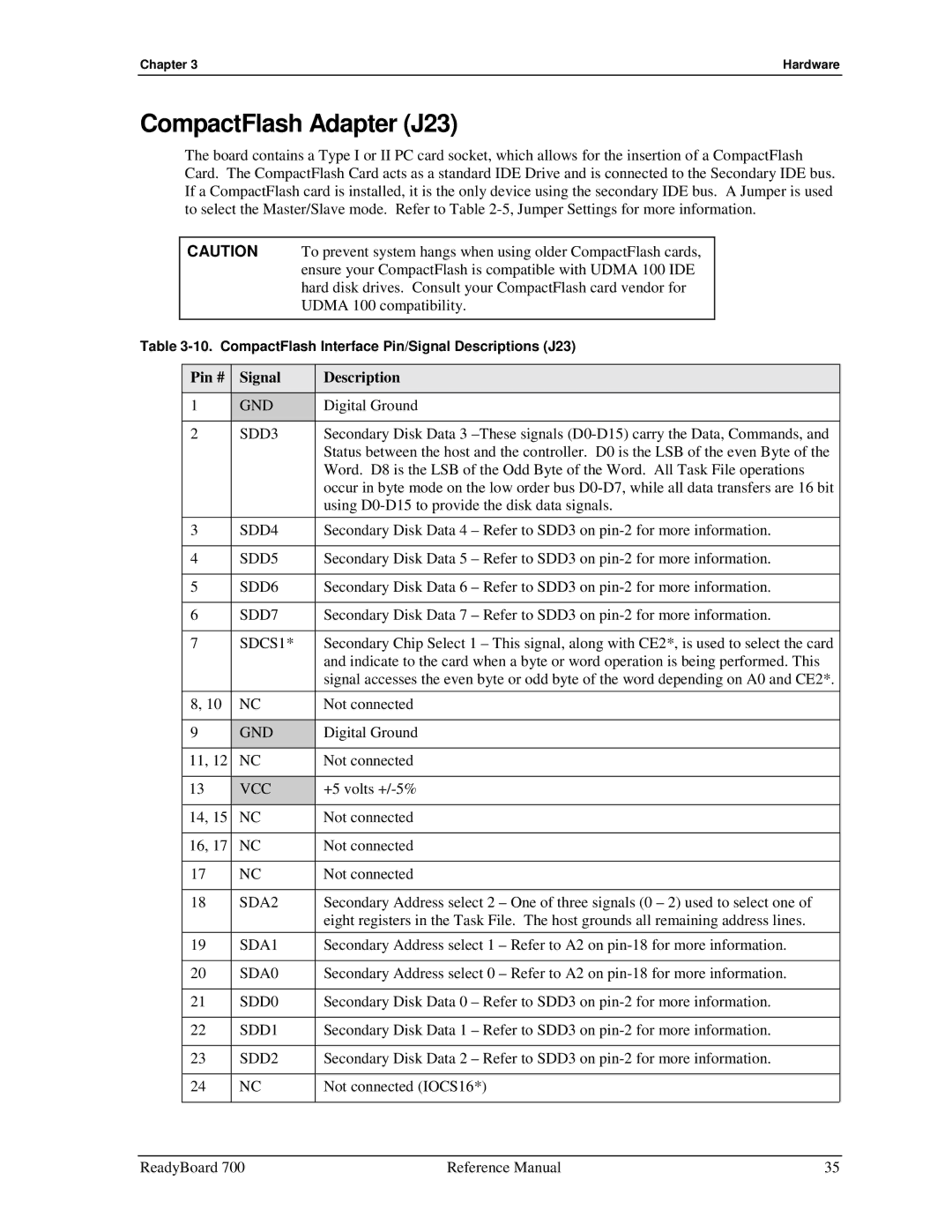
Chapter 3 | Hardware |
CompactFlash Adapter (J23)
The board contains a Type I or II PC card socket, which allows for the insertion of a CompactFlash Card. The CompactFlash Card acts as a standard IDE Drive and is connected to the Secondary IDE bus. If a CompactFlash card is installed, it is the only device using the secondary IDE bus. A Jumper is used to select the Master/Slave mode. Refer to Table
CAUTION To prevent system hangs when using older CompactFlash cards, ensure your CompactFlash is compatible with UDMA 100 IDE hard disk drives. Consult your CompactFlash card vendor for UDMA 100 compatibility.
Table
Pin # | Signal | Description |
|
|
|
1 | GND | Digital Ground |
|
|
|
2 | SDD3 | Secondary Disk Data 3 |
|
| Status between the host and the controller. D0 is the LSB of the even Byte of the |
|
| Word. D8 is the LSB of the Odd Byte of the Word. All Task File operations |
|
| occur in byte mode on the low order bus |
|
| using |
3 | SDD4 | Secondary Disk Data 4 – Refer to SDD3 on |
|
|
|
4 | SDD5 | Secondary Disk Data 5 – Refer to SDD3 on |
|
|
|
5 | SDD6 | Secondary Disk Data 6 – Refer to SDD3 on |
|
|
|
6 | SDD7 | Secondary Disk Data 7 – Refer to SDD3 on |
|
|
|
7 | SDCS1* | Secondary Chip Select 1 – This signal, along with CE2*, is used to select the card |
|
| and indicate to the card when a byte or word operation is being performed. This |
|
| signal accesses the even byte or odd byte of the word depending on A0 and CE2*. |
8, 10 | NC | Not connected |
|
|
|
9 | GND | Digital Ground |
|
|
|
11, 12 | NC | Not connected |
|
|
|
13 | VCC | +5 volts |
|
|
|
14, 15 | NC | Not connected |
|
|
|
16, 17 | NC | Not connected |
|
|
|
17 | NC | Not connected |
|
|
|
18 | SDA2 | Secondary Address select 2 – One of three signals (0 – 2) used to select one of |
|
| eight registers in the Task File. The host grounds all remaining address lines. |
19 | SDA1 | Secondary Address select 1 – Refer to A2 on |
|
|
|
20 | SDA0 | Secondary Address select 0 – Refer to A2 on |
|
|
|
21 | SDD0 | Secondary Disk Data 0 – Refer to SDD3 on |
|
|
|
22 | SDD1 | Secondary Disk Data 1 – Refer to SDD3 on |
|
|
|
23 | SDD2 | Secondary Disk Data 2 – Refer to SDD3 on |
|
|
|
24 | NC | Not connected (IOCS16*) |
|
|
|
ReadyBoard 700 | Reference Manual | 35 |
